Jump to:
Are you wondering, “what is a hair mask?” If so, you’re in the right place. We’ll show you what hair masks are, why you need one, and even give you some things to consider before hitting the store. Read on to learn all you need to know.
What Is a Hair Mask?
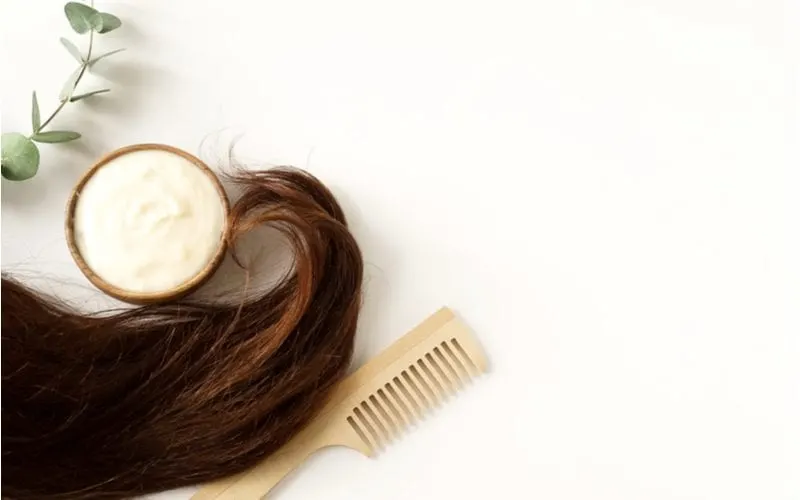
IrenaStar/Shutterstock
What does the scorching sun, a steamy-hot flat iron, and heavy-duty styling products have in common? They can all leave your hair feeling dry, brittle, and ready to snap. No matter what hair sins you’ve committed, or if you just think your hair needs that something extra, a hair mask might be in order.
We put our hair through a lot, so there’s a good chance it needs some serious TLC. That said, what exactly is a hair mask? Stick with us as we answer that very question here in this blog post.
First things first — what is a hair mask? Put simply, a hair mask is a deep conditioning treatment you can use at home to revive damaged hair. Typically, hair masks include a heavier concentration of:
- Natural oils
- Butters
- Lipids
That’s what makes them so effective at restoring dry locks. Usually, you apply hair masks evenly, covering 2/3 of your hair, working from the bottom up. Then, you leave the product on for a specified amount of time. This can be anywhere from a few minutes to overnight.
Read Next: Our Favorite Hair Masks
Benefits of Hair Masks
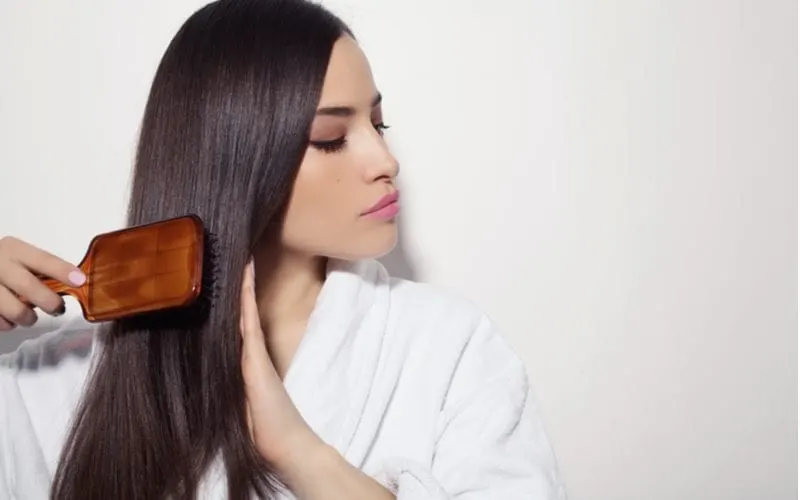
Mysticlight/Shutterstock
There are many benefits to regularly applying hair masks. However, these fluctuate depending on your hair type and the ingredients in the mask. That said, some of the more general advantages include:
- Achieving shinier, stronger hair
- Reducing the likelihood of hair breakage, damage, and frizz
- Softening your hair
- Adding moisture to your locks
- A healthier scalp
Hair masks are so effective because they give your hair and scalp the natural ingredients it needs. But we’ll get to that in just a second.
Types of Hair Masks
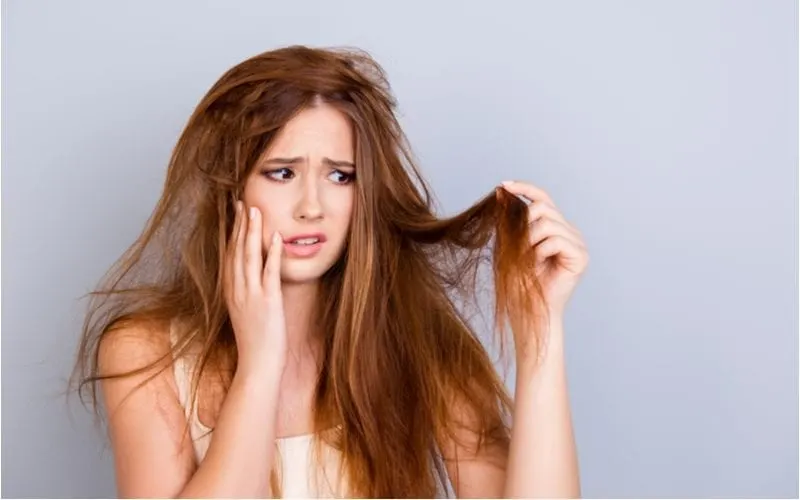
Roman Samborskyi/Shutterstock
Like shampoos and conditioners, there are many different kinds of hair masks specially designed to suit specific hair types:
Masks for Dyed/Bleached Hair
Every time we apply hair color, we lose moisture. This is why masks for color-treated hair often contain substances that boost the longevity of your color while strengthening and rehydrating your hair.
Masks for Damaged Hair
Suppose you’ve used lots of heated appliances and hair products. In that case, you’ll likely have overly porous hair that’s prone to damage and dryness. This is where a hair mask comprising keratin, essential fatty acids, vitamins, and humectants, can come to the rescue.
Read Next: Best Vitamins for Hair
Masks for Oily Hair
Hair masks for oily hair are specially designed to balance sebum secretion. This helps keep your scalp clean while adding volume to your roots without causing undue greasiness.
Unlike most hair masks, these kinds of masks are usually applied from root to tip. Typically, masks for oily hair are natural green or white clays containing nettle, burdock, or sage extracts.
These ingredients work wonders for absorbing excess sebum, which, as we’ve already said, can reduce greasiness.
Masks for Curly Hair
Masks containing curl-defining substances are often exceptionally lightweight and suitable for priming curls for long-lasting style.
Read Next: Best Products for Curly Hair
How to Use a Hair Mask
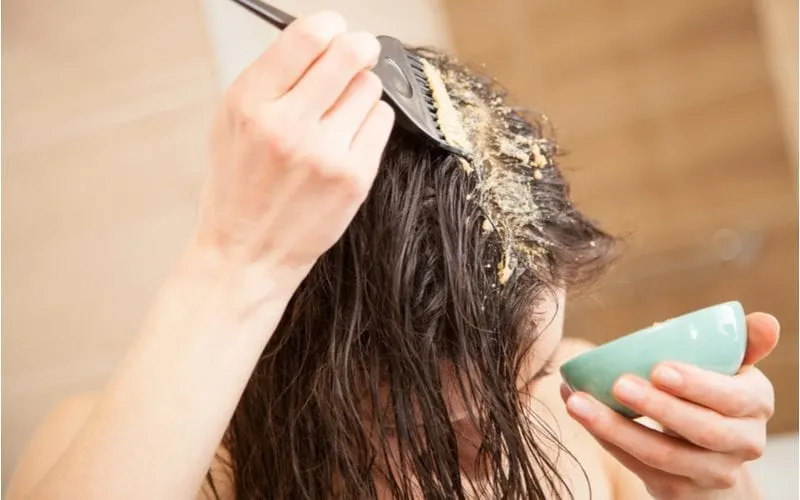
Maryna Pleshkun/Shutterstock
If you’ve never used a hair mask before, always follow the instructions on the label. But, generally speaking, this is how most hair masks are applied:
- Wash and condition your hair as normal
- Squeeze any excess water from your hair
- Apply the mask to the lower two-thirds of your hair.
- Massage the mask into the strands to ensure an even coverage
- Leave your mask on your hair for the specified duration.
- Rinse your hair clean so that any build-up released by the mask is washed away.
- Pat dry your hair with an old t-shirt or a microfiber towel. Regular towels can be too abrasive on your hair follicles and create frizz and encourage split ends.
Ideally, you should apply a hair mask once a week as part of your regular hair care routine. However, if you suffer from dehydrated and damaged hair, use a hair mask as needed.
Ingredients in Quality Hair Masks
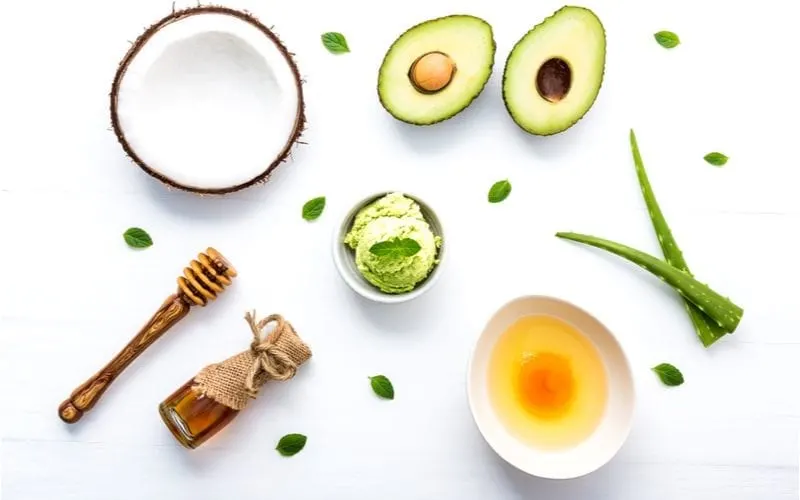
Wassana Panapute/Shutterstock
Whether you’re looking to make your own hair mask or purchase one online or in-store, you want a product rich in natural oils. For example, jojoba, olive, almond, and/or avocado oil.
Avocado Oil
Avocado oil, in particular, contains folic acid, iron, and magnesium. Studies suggest these nutrients can seal your hair cuticles to make your hair more robust to damage and breakage.
Olive Oil
If you’re suffering from dehydrated hair, then a hair mask with olive oil is fantastic. Since it contains squalene (a substance our bodies naturally produce to keep our skin and hair moisturized), olive oil is excellent for providing intense moisture.
Unfortunately, our squalene production dwindles as we age, making olive oil a go-to for aging hair prone to dryness.
Coconut Oil
Coconut oil boasts a low molecular weight. As such, it’s able to enter deep into the hair shaft for more intense conditioning. Needless to say, this works wonders for subduing dryness and frizz.
Bananas and Honey
Some hair masks also include bananas and honey. These food products boast unique properties that can restore your hair’s health. Thanks to the silica in bananas, this fruit is excellent for reducing frizz and making your hair softer and shinier.
Some studies even suggest that bananas possess antimicrobial properties that can help reduce dryness and dandruff.
And honey? This food is considered a humectant. In layperson’s terms, this means honey can help our hair to absorb and retain more moisture. There’s also evidence to suggest that honey promotes the growth of skin cells, which in turn helps generate stronger hair follicles.
Yogurt and Eggs
Other food products like yogurt may be included in hair masks – namely, for its lactic acid, which is also effective for treating dull and damaged hair. Hair masks containing yogurt are perfect if you suffer from dandruff, as yogurt’s antifungal properties are known to help treat and even prevent dandruff.
Egg yolks are also a popular ingredient for hair masks as they contain vitamin A and E, biotin, and folate. There’s some research to suggest these nutrients promote hair growth.
Aloe
Lastly, you may find that some hair masks contain aloe vera. If you’re looking for something to soothe your scalp, a hair mask with aloe vera is well worth considering.
Its anti-inflammatory properties work wonders for calming irritated skin. Aloe vera also comprises vitamins C, E, B-12, folic acid, and choline. All of which have been said to help rejuvenate hair.
So, What Is a Hair Mask?

New Africa/Shutterstock
So, what is a hair mask? All in all, if you’re looking to add something to your hair care routine that repairs and protects your hair from daily styling, heat appliances, and severe weather conditions, a hair mask is just the thing.
Just be sure to do some research to ensure you pick the best possible product for your hair type. But don’t worry — we’ve done that for you too… check out our guide: Best Hair Masks for All Hair Types
